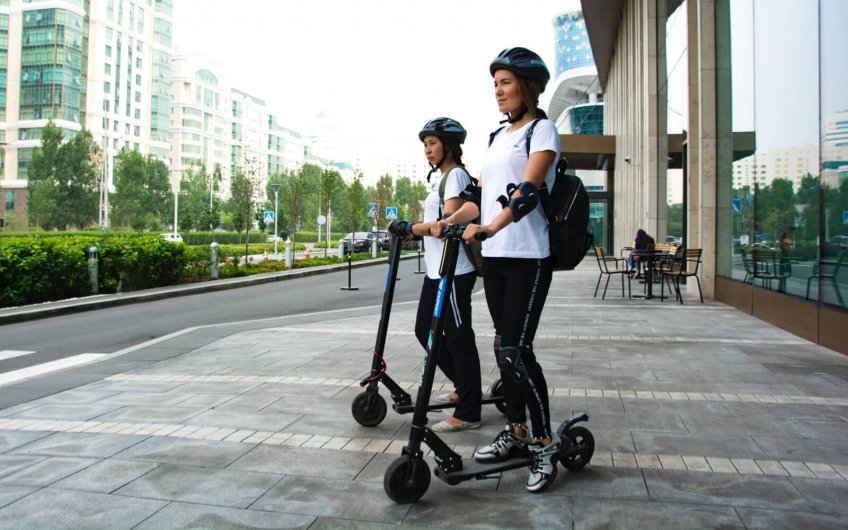
The Directorate-General for Traffic (DGT) has published a Provisional Directive that will affect the Electric scooter regulations in Madrid. It has established a series of criteria to control and manage the safety of the users of these vehicles.
Electric scooters are still a very popular transport alternative, due to the comfort and flexibility they offer.
If you are thinking of using an electric scooter it is important to be aware of the obligations that you must comply with in order to respect current traffic regulations. Don´t forget that this type of vehicle can reach speeds of up to 50 kilometres/hr and, therefore, may entail certain risks.
Just like with cars and motorcycles, there is a minimum age in order to be able to ride an electric scooter, as well as having to respect blood alcohol levels, know the regulations regarding the use of headphones, and be aware of everything concerning insurance and the required mandatory equipment.
The regulations in Madrid are very clear about the age you have to be in order to be able to ride an electric scooter. According to article 176 of the Urban Mobility Ordinance, users must be at least 15 years old to be able to legally circulate on public roads. If you do not respect these regulations imposed by Madrid City Council, you will face a fine of 30 euros.
In addition, the new Provisional Directive imposed by the DGT has established that, in the event that minors under the age of 18 commit an offence, parents, guardians or persons legally or actually responsible shall be held jointly and severally liable for the offence committed.
Using headphones while riding an electric scooter is not permitted by the authorities, since listening to music or other sounds may affect the concentration of the person riding the scooter, possibly leading to a risk. Therefore, it is important not to listen to music while riding an electric scooter, as you may be faced with a fine of 200 euros. The same goes for using mobiles.
Alcohol consumption while riding electric scooters is not recommended and, therefore, the same regulations as with any type of motor vehicle apply.
Any rider of these Personal Mobility Vehicles (VMP) is required to submit to any alcohol and drug test. If refused, the rider will be deemed to have committed an administrative infraction.
Exceeding the level of 0.25 of alcohol per litre in blood can lead to severe economic sanctions, anywhere from 500 euros to 1,000 euros, as well as civil and even criminal liabilities. As you know, the best blood alcohol level is 0.0%..
The regulation requires the use of a helmet, as is the case for all cyclists. Riding without the regulatory helmet may lead to a fine of 200 euros and the vehicle being confiscated.
In addition, if you ride an electric scooter at night, you must use lighting, wear reflective clothing and elements, because if not, the rider is not taking the necessary measures to be seen by others. The financial penalty for failure to do so is 200 euros.
It is important that you take extreme precautions when riding an electric scooter. Especially in summer, when wearing short-sleeved clothing. Using knee and elbow pads can help you minimise damage in the event of an accident.
Passengers cannot ride on electric scooters. In other words, only one person can ride on it at a time. If caught riding with more than one person, the financial penalty will be 100 euros.
At this point, the law is somewhat more ambiguous. However, it states that all electric scooters that are used for some professional purpose will be required to have civil liability insurance similar to other vehicles, such as cars or motorcycles, which are required to have so under all circumstances. For example, tourist visits are considered an economic activity.
The rise of electric scooters in Spain´s main cities, such as Madrid or Barcelona, forced the council to establish specific regulations for this type of vehicle. Therefore, you should be aware that there are areas where scooters can and cannot be ridden.
It is prohibited to ride on footpaths and pedestrian zones, as article 121 of the General Traffic Regulations prohibits any vehicle from circulating on footpaths (except for skateboards, rollerblades and similar that do so exclusively at walking pace). If caught riding on pavements, the fine will be 200 euros, although this may vary depending on Local Ordinances.
On the other hand, within 30 km/h zones, electric scooters can be ridden on the road, as well as on the bicycle lane and bicycle boulevard.
It is the local ordinances that establish the prohibitions related to where these vehicles can be parked.
As a general rule, they should be parked in places reserved for motorcycles and bicycles. However, as these vehicles coexist, they can also be parked on the road´s general parking strip, or as a last resort, on the footpath provided that a minimum safety distance of three metres is respected.
It is necessary to respect these regulations both on and off the M-30.
With this Provisional Directive, the Directorate-General for Traffic will regulate the use of electric scooters in Madrid and the rest of Spain. You must read the regulations correctly to avoid having to pay economic sanctions.